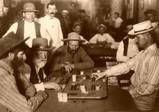See other Dead Constitution Articles
Title: UN arms treaty could put U.S. gun owners in foreign sights, say critics
Source:
FAUX NEWS
URL Source: http://www.foxnews.com/world/2012/0 ... in-foreign-sights-say-critics/
Published: Jul 11, 2012
Author: Steven Edwards is a UN-based freelance j
Post Date: 2012-07-11 19:08:41 by noone222
Keywords: None
Views: 111
Comments: 3
UNITED NATIONS – A treaty being hammered out this month at the United Nations -- with Iran playing a key role -- could expose the records of America's gun owners to foreign governments -- and, critics warn, eventually put the Second Amendment on global trial. International talks in New York are going on throughout July on the final wording of the so-called Arms Trade Treaty, which supporters such as Amnesty International USA say would rein in unregulated weapons that kill an estimated 1,500 people daily around the world. But critics, including the National Rifle Association’s Wayne LaPierre, warn the treaty would mark a major step toward the eventual erosion of the U.S. Constitution’s Second Amendment gun-ownership rights. Americans “just don’t want the UN to be acting as a global nanny with a global permission slip stating whether they can own a gun or not,” LaPierre said. “It cheapens our rights as American citizens, and weakens our sovereignty,” he warned in an exclusive interview with FoxNews.com from the halls of the UN negotiating chambers. “It cheapens our rights as American citizens, and weakens our sovereignty.” - Wayne LaPierre, National Rifle Association The world body has already been criticized for appointing Iran to a key role in the talks, even as Tehran stands accused by the UN of arming Syrian President Bashar al-Assad's bloody crackdown on rebels. The Obama administration in 2009 reversed Bush administration policy by agreeing to take part in the talks. But in another exclusive interview with FoxNews.com, the top government official on the issue under President Bush says he’s seen nothing new to convince him the U.S. should be at the table today. While the treaty’s details are still under discussion, the document could straitjacket U.S. foreign policy to the point where Washington could be restricted from helping arm friends such as Taiwan and Israel, said Greg Suchan, Deputy Assistant Secretary in the State Department’s Bureau of Political-Military Affairs from 2000 to 2007. Suchan also highlighted ongoing concern that the treaty may end up giving foreigners access to U.S. gun-ownership records. On that score, LaPierre, who serves as NRA executive vice president, warns that the “UN’s refusal” to remove civilian firearms and ammunition from the scope of the treaty amounts to a declaration that only governments should be gun owners. But he revealed he was set Wednesday to tell the UN gathering that 58 U.S. senators had signed a letter saying that they would refuse to ratify any treaty that includes controls over civilian guns or ammunition. Ratification by two-thirds of the Senate is necessary before an international treaty negotiated by the executive branch can become U.S. law. But the treaty could still go into effect elsewhere once 65 countries ratify it. Such a development could change the pattern of world arms transfers and reduce the U.S. share, which stands at about 40 percent of up to $60 billion in global deals. The Bush administration opposed a 2006 UN General Assembly resolution launching the treaty process, but President Obama decided the U.S. would take part on condition the final agreement be reached by consensus -- thereby giving any of the 193 participating states an effective veto. The safeguard is insufficient for opponents of the U.S. participation, not least because UN talks invariably involve compromise. “The administration swears they have a whole bunch of red lines, and they will block consensus if anyone crosses them,” said Suchan, now a government relations consultant as senior associate with the Commonwealth Consulting Corporation in Arlington, Va. “But the dynamics of international negotiations are that once you get 90 percent of what you seek, you say, ‘Maybe there is a way we can finesse the final 10 percent.’” A clause permitting arms transfers solely between UN member states would allow UN member China to object to U.S. arms sales to Taiwan, a non-UN member that China considers to be a renegade province. This would be highly problematic for the U.S. at a time when Beijing is engaged in an unprecedented arms buildup. Another fear is that Arab or other states critical of Israel may use any treaty language on human rights standards to argue against U.S. arms transfers to the Israeli government – much in the same way they currently use the UN Human Rights Council to repeatedly condemn Israel. Suchan said U.S. arms trade law is seen as the global “gold standard” for regulating arms transfers, but doubted many countries would be willing to raise the bar that high. Instead, the treaty that emerges is expected to set a lower global standard – which Suchan said would have the effect of reducing Washington’s ability to press for voluntary arms embargoes against rogue states. “We might want to urge a country to not sell arms to a state whose government is particularly odious,” Suchan explained. “But that government could then ask whether the sale is prohibited under the Arms Trade Treaty – and if it is not, they would argue they are meeting the international standard.” U.S. gun lobby concern focuses on the emphasis the treaty places on governmental – as opposed to individual – rights to guns, LaPierre explained. “They’re trying to impose a UN policy that gives guns to the governments – but the UN doesn’t in turn make moral judgments as to whether these governments are good or bad,” he said. “If you’re the government, you get the guns, if you’re a civilian, you don’t. But this will just end up helping evil governments and tyrants.” For LaPierre, the emphasis he sees at the UN on governmental rights reflects what he believes is a wider international tradition that contrasts with the historical American emphasis on individual rights. “The UN view is that governments – not individual citizens – ought to protect people,” he said, signaling that this principle permeates the draft that negotiators are currently working with. LaPierre says the treaty that is likely to emerge will have the effect of squeezing individual gun owners in the United States and elsewhere by imposing on them an onerous collection of regulations. “If they get this through, then what comes along is the institutionalizing of the whole gun control-ban movement within the bureaucracy of UN – with a permanent funding mechanism that we [in America] will be mainly paying for,” he said. “The world’s worst human rights abusers will end up voting for this, while the Obama administration has not drawn a line in the sand like the previous administration did. Instead, it is trying to be a part of this train wreck because they think they can somehow finesse it. But, to me, there is no finessing the individual freedoms of American citizens.” Steven Edwards is a UN-based freelance journalist Read more: www.foxnews.com/world/201...ay-critics/#ixzz20MHD7udE Poster Comment: Aren't you glad that you registered your guns ?????
Post Comment Private Reply Ignore Thread
Top • Page Up • Full Thread • Page Down • Bottom/Latest
#1. To: noone222 (#0)
I sold them all at the last gun show I attended.
Me too ! "In an unjust society, the only place for a just man is prison." Thoreau
Owe-bama may serve his Kenite masters but we should NOT!! DEFY and JURY NULLIFY ANY LAWS RESULTING FROM INTERNATIONAL SMALL ARMS TREATIES MADE BY THE FALSE MESSIAH OF THE ONE WORLD SYSTEM AND HIS KENITE OVERLORDS!!! To even wish them godspeed in their evil works IS TO PARTAKE OF THOSE EVIL WORKS YOUERSELVES!!! Aren't you glad that you registered your guns ?????
#2. To: Jethro Tull (#1)
I sold them all at the last gun show I attended.
#3. To: noone222 (#0)
Top • Page Up • Full Thread • Page Down • Bottom/Latest

